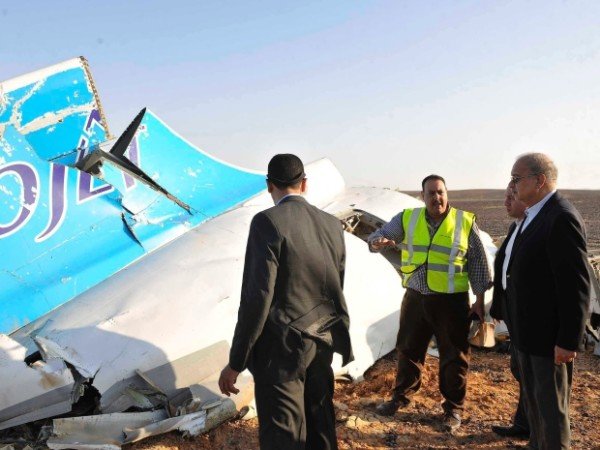Sinai Plane Crash: Egypt Rejects ISIS Claim
According to Egypt’s PM Sharif Ismail, a technical fault was the most likely to cause Russia’s Kogalymavia plane crash in Sinai dismissing claims from Islamic State militants that they were responsible.
An investigation is under way after all 224 people on board were killed.
However, three airlines – Emirates, Air France and Lufthansa – have decided not to fly over the Sinai Peninsula until more information is available.
The plane’s black boxes have been found and sent for analysis, officials said.
The Kogalymavia Airbus A-321 came down early on October 31, shortly after leaving the resort of Sharm el-Sheikh for the Russian city of St Petersburg.
Egypt’s civil aviation minister Hossam Kamal said there had been no sign of any problems on board the flight, contradicting earlier reports that the pilot had asked to make an emergency landing.
An Egyptian official had previously said that before the plane lost contact with air traffic controllers, the pilot had said the aircraft was experiencing technical problems and he intended to try to land at the nearest airport.
Russian and French investigators have joined the Egyptian-led probe, along with experts from Airbus, which is headquartered in France.
A criminal case had been opened against Kogalymavia for “violation of rules of flight and preparation for them”, Russia’s Ria news agency reported.
Police have searched the company’s offices.
Kogalymavia spokeswoman Oksana Golovina insisted the 18-year-old plane was “fully, 100% airworthy” and added that the pilot had 12,000 hours of flying experience.
In Sinai itself, where jihadists groups are active, militants allied to IS made a claim on social media that they brought down flight KGL9268.
However, Egyptian PM Sharif Ismail dismissed the claim, saying experts had confirmed that a plane could not be downed at the altitude the Airbus 321 was flying at.
Russian Transport Minister Maksim Sokolov told Interfax news agency that “such reports cannot be considered true”. No evidence had been seen that indicated the plane was targeted, he said.
Egypt’s civilian aviation ministry said the plane had been at an altitude of 31,000ft when it disappeared.
Security experts say a plane flying at that altitude would be beyond the range of a shoulder-launched surface-to-air missile (Manpad), which Sinai militants are known to possess.
However, German carrier Lufthansa said it would avoid flying over the Sinai peninsula “as long as the cause for today’s crash has not been clarified”.
On Saturday evening, Air France-KLM and Emirates said they were following suit.
British Airways and easyJet said their routes were regularly reviewed, but that they had no plans to alter their routes to and from Sharm el-Sheikh.
